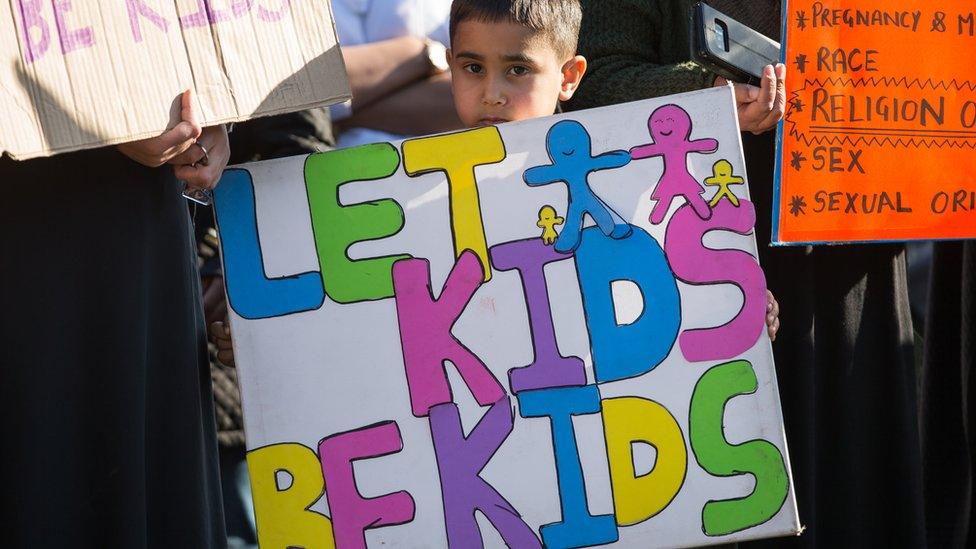Why gay dads worry about starting primary school
- Published
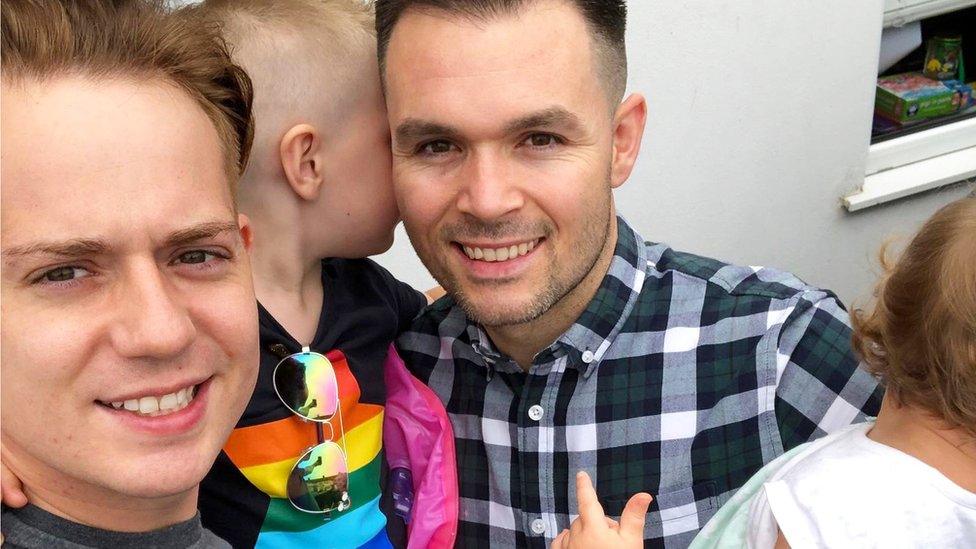
Rich and Lewis want their children to understand their relationship from an early age.
Two gay fathers have described how encounters with parents at their son's nursery school have left them wondering how difficult it will be for them to be accepted as he starts primary.
"When we have turned up at the school gates, people have asked, 'Is Mummy having a day off, then?'" they said.
"It scares me that our children could grow up thinking we're circus freaks."
But the couple, Rich and Lewis, said addressing the issue in class had made a real difference.
'Dad and Daddy'
"We asked our son's nursery teacher to read a story-time book about two daddies," said Lewis, who preferred not to share their surname for their children's privacy.
"Suddenly, all of his classmates understood a bit more about him and why he might say things differently and why he might talk about his 'Dad and Daddy' to them.
"Our boy felt really good that day.
"We were expecting negativity from parents but we asked the teacher about it and nobody had made any comments.
"It really is a minority of people who are against inclusive education."
'Bad parents'
His beliefs are backed up by a survey for equality charity Stonewall that suggests 60% of British adults think primary-school children should learn about LGBT families.
Rich and Lewis are bringing up two young children they adopted, one of whom has just started primary school, and they are keen their children understand their relationship from an early age.
"We don't want to be hidden," Rich said. "I want our children to know that we exist and our family is valid and I would prefer for them to learn about LGBT people in school because it's safe."
As gay parents, they don't see themselves as different but are aware that it is a new experience for many.
"We purposefully try to make ourselves perfect because we're so worried about people looking at us," Rich said.
"And we specifically struggled with that when we had our first little boy.
"The first thing we were worried about was, 'Is he always clean, has he got his dummy and has he got what he needs,' because we didn't want to look like bad parents."
Opt out
England's schools are gearing up for a new relationship and sex curriculum, which comes into force in September 2020.
This will require:
primary schools to teach about different families
secondary schools to teach about sexual orientation and gender identity
Parents will be able to have their child opt out of sex education but there will be new rights for pupils to opt in after the age of 15.
There have been protests outside some primary schools in Birmingham against equality teaching already happening.
But in the survey, by nfpSynergy of a representative sample of 1,000 British adults, 60% said it was right teachers at primary schools talked to their pupils in a positive way about different kinds of families. Of them, 51% were men and 67% were women. Some 8% disagreed and 9% strongly disagreed.
And of those aged 16 to 24, 68% supported LGBT-inclusive teaching.
The survey was conducted for Stonewall, a charity founded 30 years ago to lobby against Section 28 of the Local Government Act 1988, which banned the teaching "of the acceptability of homosexuality as a pretended family relationship".
'Different shapes'
In Scotland and Northern Ireland, relationships and sex education (RSE) as a subject must be taught but schools decide their own approach.
The Welsh Government says it will introduce LGBT-inclusive RSE but has not yet released the final version of the curriculum.
Antonia Tully, from a group called Safe at School, has campaigned from the outset against RSE being made a compulsory school subject in England.
She said: "Parents are the best people to teach their children about different types of relationships.
"Compulsory relationships education in primary schools places parents in second place."
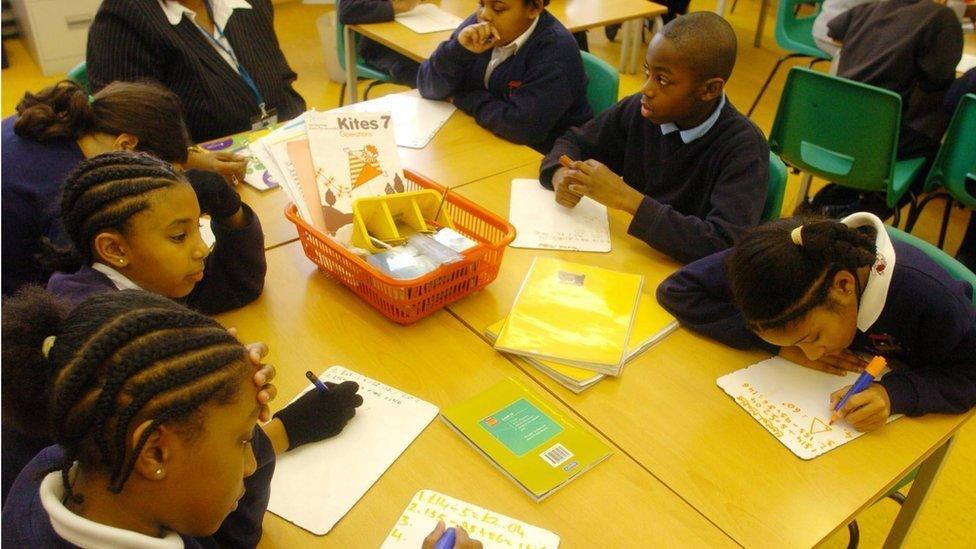
A mandatory curriculum on relationship education will be introduced in schools in England from September 2020
England's Schools Minister, Nick Gibb, himself in a long-term gay relationship, has said: "It's important that the next generation learns that families come in different shapes and sizes."
'Straight education'
Rich and Lewis believe their family is an example of the difference having an LGBT-inclusive classroom can make.
Rich said: "I didn't come out until I was 24 years old though, because it just was not the done thing in my school or in my area.
"It seemed like being the gay kid in school came with not doing well and suffering a lot of bullying.
"If people could understand LGBT lives earlier, then maybe they'll be more accepted earlier. It just sets everyone up for the future.
"People still believe that teaching people about LGBT lives will teach them to be gay.
"I couldn't have had a more straight education - but my sexuality was already decided."
For more stories like this, follow the BBC LGBT correspondent Ben Hunte on Twitter, external and Instagram, external.
- Published22 May 2019
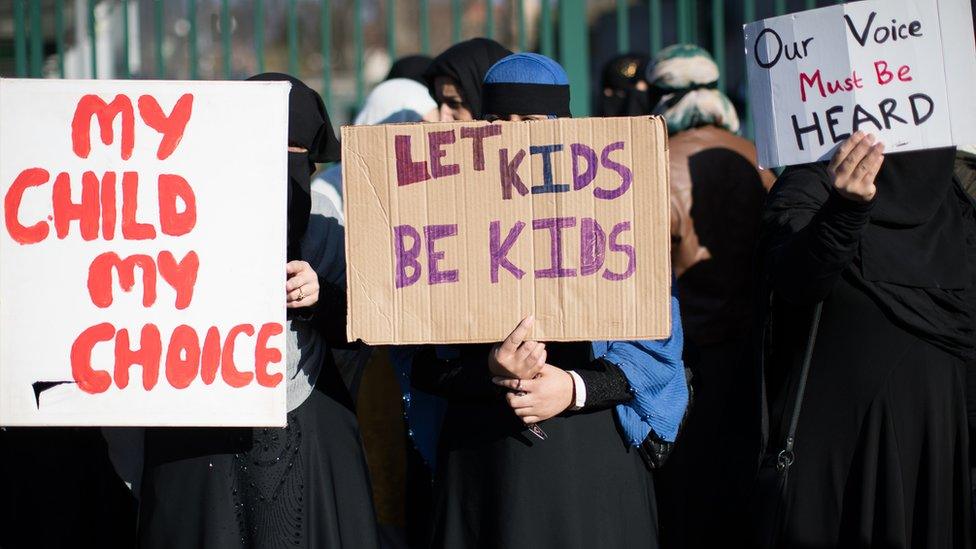
- Published14 June 2019
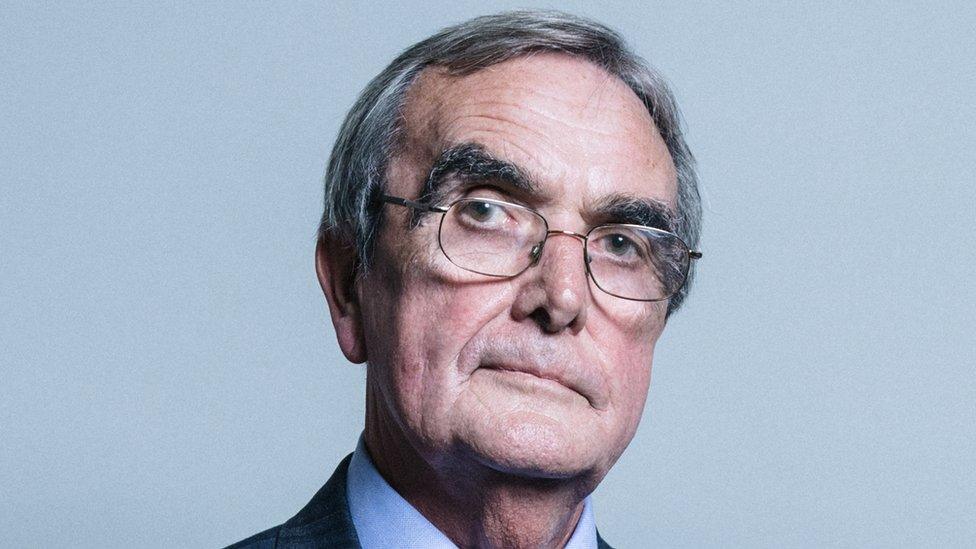
- Published25 May 2019
